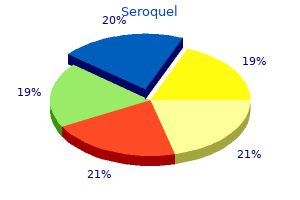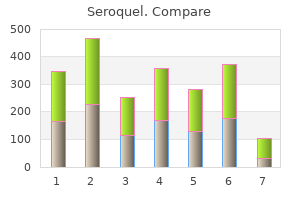"Purchase genuine seroquel online, medicine 123".
By: R. Jorn, M.S., Ph.D.
Co-Director, UTHealth John P. and Katherine G. McGovern Medical School
Direct observation of therapy is considered essential to ensure compliance in the initial phase and is also useful in the continuation phase medications during pregnancy order seroquel from india, especially if patients are receiving rifampicin medications 25 mg 50 mg order 200 mg seroquel with visa. Unsupervised and alternative regimens as set out in the following tables may be administered as specified. Chemoprophylaxis with isoniazid can prevent the development of clinically apparent disease in persons in close contact with infectious patients, and also prevent the reactivation of previously dormant disease in other persons at high risk particularly those who are immunodeficient. Anti-infective medicines Diagnosis the tuberculin test has limited diagnostic value. Recommended 6-month treatment regimens for tuberculosisa Medicine Isoniazid + Rifampicin + Pyrazinamide Initial phase (2 months) 5 mg/kg daily 10 mg/kg daily 25 mg/kg daily 15 mg/kg daily 15 mg/kg dailyc 10 mg/kg 3 times weekly 10 mg/kg 3 times weekly 35 mg/kg 3 times weekly 15 mg/kg 3 times weekly 30 mg/kg 3 times weekly 10 mg/kg 3 times weekly 10 mg/kg 3 times weekly Continuation phase (4 months) 5 mg/kg daily 10 mg/kg daily together with Streptomycinb or Ethambutol Isoniazid + Rifampicin + Pyrazinamide Streptomycinb together with or Ethambutol Recommended 8-month treatment regimen for tuberculosisa Medicine Isoniazid + Rifampicin + Pyrazinamide Initial phase (2 months) 5 mg/kg daily 10 mg/kg daily 25 mg/kg daily 15 mg/kg daily 15 mg/kg dailyc 15 mg/kg daily Continuation phase (6 months) 5 mg/kg daily together with Streptomycinb or Ethambutol a Unless otherwise indicated, doses are suitable for both adults and children. Anti-infective medicines Continuation phase1 (antibacterials administered daily or 3 times weekly): isoniazid + rifampicin for 4 months (or isoniazid + ethambutol for 6 months but less effective than isoniazid + rifampicin). Continuation phase1 (antibacterials administered daily or 3 times weekly): isoniazid + rifampicin + ethambutol for 5 months. Patients should report visual disturbances immediately and discontinue treatment; children who are incapable of reporting symptomatic visual changes accurately should be given alternative therapy, as should, if possible, any patient who cannot understand warnings about visual adverse effects. Adverse effects: optic neuritis including reduced visual acuity and red/green colour blindness (early changes usually reversible; prompt withdrawal may prevent blindness); peripheral neuritis (especially in legs); gout; rarely rash, pruritus, urticaria, and thrombocytopenia. Patients or their carers should be told how to recognize signs of liver disorder, and advised to discontinue treatment and seek immediate medical attention if symptoms such as persistent nausea, vomiting, malaise or jaundice develop. Adverse effects: hepatotoxicity including fever, anorexia, hepatomegaly, splenomegaly, jaundice, and liver failure; nausea, vomiting; flushing; dysuria; arthralgia; gout; sideroblastic anaemia; rash, photosensitivity. Resumption of rifampicin treatment after a long interval may cause serious immunological reactions, resulting in renal impairment, haemolysis, or thrombocytopenia - discontinue permanently if serious adverse effects occur. Patients or their carers should be told how to recognize signs of liver disorders and advised to discontinue treatment and seek immediate medical attention if symptoms such as persistent nausea, vomiting, malaise, or jaundice develop. Anti-infective medicines Adverse effects: severe gastrointestinal disturbances including anorexia, nausea, vomiting, and diarrhoea (antibiotic-associated colitis reported); headache, drowsiness; rash, fever, influenza-like syndrome and respiratory symptoms, collapse, shock, haemolytic anaemia, acute renal failure, and thrombocytopenic purpura (more frequent with intermittent therapy); alterations of liver function, jaundice, and potentially fatal hepatitis (dose related; do not exceed maximum dose of 600 mg daily); oedema, muscular weakness and myopathy, exfoliative dermatitis, toxic epidermal necrolysis, pemphigoid reactions, leukopenia, eosinophilia, and menstrual disturbances also reported; urine, tears, saliva, and sputum coloured orange-red. Rifampicin + isoniazid + pyrazinamide Tablet: 60 mg + 30 mg + 150 mg; 150 mg + 75 mg + 400 mg. Contraindications: combined preparation not suitable for use in children; see also under Ethambutol, Isoniazid, Pyrazinamide, and Rifampicin. Anti-infective medicines Streptomycin Powder for injection: 1 g (as sulfate) in vial. Adverse effects: vestibular and auditory damage, nephrotoxicity; hypersensitivity reactions (withdraw treatment); paraesthesia of mouth; rarely hypomagnesaemia on prolonged therapy; antibiotic-associated colitis; also, nausea, vomiting, and rash; rarely haemolytic anaemia, aplastic anaemia, agranulocytosis, and thrombocytopenia; pain and abscess at injection site. Superficial infections affect only the skin, hair, nails or mucous membranes, whereas systemic fungal infections affect the body as a whole. Systemic fungal infections are sometimes caused by inhalation, ingestion or inoculation of primary pathogens, and sometimes by opportunistic invasion of commensals in patients with lowered host resistance. Anti-infective medicines is a lipophilic polyene antibiotic; it is fungistatic against a broad spectrum of pathogenic fungi, including Candida spp. It is used for the empirical treatment of serious fungal infections and is used alone or in conjunction with flucytosine to treat cryptococcal meningitis and systemic candidosis. Duration of therapy depends on the initial severity of the infection and the clinical response of the patient. In some infections, a satisfactory response is only obtained after several months of continuous treatment. Treatment involves insertion of pessaries (vaginal tablets) or cream high into the vagina (including during menstruation). Recurrent infection may be treated with a high-dose pessary every week for 6 months. Fluconazole, an orally active synthetic imidazole derivative, possesses fungistatic activity against dermatophytes, yeasts, and other pathogenic fungi. Fluconazole is also used to prevent fungal infections in immunocompromised patients. Flucytosine is a synthetic fluorinated pyrimidine with a narrow spectrum of antifungal activity, but which is particularly against Cryptococcus and Candida spp.

In combination with azacitidine or decitabine for relapsed or refractory disease 3 2 medications that help control bleeding 50 mg seroquel overnight delivery. Desmoid tumors (aggressive fibromatosis) medications used for depression cheap seroquel 300 mg without a prescription, primary, recurrent, or progressive disease c. Epithelial ovarian cancer, fallopian tube cancer, and primary peritoneal cancer; if platinum-resistant, in combination with topotecan for persistent disease or recurrence All other indications are considered experimental/investigational and are not a covered benefit. Authorization of 12 months may be granted for treatment of unresectable or metastatic hepatocellular carcinoma. Authorization of 12 months may be granted for treatment of hepatocellular carcinoma for subsequent treatment as a single agent for members who progressed after first-line lenvatinib. Authorization of 12 months may be granted for treatment of primary, recurrent, or progressive desmoid tumor/aggressive fibromatosis. Renal Cell Carcinoma Authorization of 12 months may be granted for treatment of advanced renal cell carcinoma. Medullary Thyroid Carcinoma Authorization of 12 months may be granted for treatment of medullary thyroid carcinoma when either of the following criteria are met: 1. Authorization of 12 months may be granted for treatment as second-line therapy for relapsed/refractory or metastatic disease as a single agent for the following types of bone cancer: a. Epithelial Ovarian Cancer/Fallopian Tube Cancer/Primary Peritoneal Cancer Authorization of 12 months may be granted for treatment of epithelial ovarian, fallopian tube, or primary peritoneal cancer if the disease is platinum-resistant and Nexavar is given in combination with topotecan for persistent disease or recurrence. Indicated for long-term maintenance therapy in acromegalic patients who have had an inadequate response to surgery and/or radiotherapy, or for whom surgery and/or radiotherapy is not an option. Meningiomas Authorization of 24 months may be granted to members for treatment of unresectable meningioma. Thymomas and thymic carcinomas Authorization of 24 months may be granted for treatment of thymomas and thymic carcinomas. Medications known to exacerbate hypertriglyceridemia (such as beta blockers, thiazides, estrogens) should be discontinued or changed if possible prior to consideration of triglyceride-lowering drug therapy. Limitations of Use the effect of Epanova on the risk for pancreatitis has not been determined. The effect of Epanova on cardiovascular mortality and morbidity has not been determined. Usage Considerations: Patients should be placed on an appropriate lipid-lowering diet before receiving Lovaza and should continue this diet during treatment with Lovaza. Laboratory studies should be done to ascertain that the lipid levels are consistently abnormal before instituting Lovaza therapy. Every attempt should be made to control serum lipids with appropriate diet, exercise, weight loss in obese patients, and control of any medical problems such as diabetes mellitus and hypothyroidism that are contributing to the lipid abnormalities. Limitations of Use the effect of Vascepa on the risk for pancreatitis in patients with severe hypertriglyceridemia has not been determined. The effect of Vascepa on cardiovascular mortality and morbidity in patients with severe hypertriglyceridemia has not been determined. Triglycerides and Cardiovascular Disease: A Scientific Statement From the American Heart Association. Extranodal natural killer/T-cell lymphoma, nasal type: as a component of multi-agent chemotherapeutic regimen 2. Moderately to severely active polyarticular juvenile idiopathic arthritis in patients 2 years of age orolder 3. Member has experienced an inadequate response to at least a 3-month trial ofmethotrexate despite adequate dosing. Authorization of 24 months may be granted for members who have previously received Orencia or Actemra. All other indications are considered experimental/investigational and are not a covered benefit. Authorization of 24 months may be granted for treatment of moderate to severe plaque psoriasis when all of the following criteria are met: 1.
Cheap seroquel 100mg otc. Ouch! MS Hug!?.

Syndromes
- Bronchitis
- Scar sensitivity
- Permanent bladder damage (incontinence/urinary retention)
- Cough -- dry
- Decreased vision
- Feeling hopeless or helpless
- Intravenous (IV) fluids, including nutrition
- Lack of sleep due to nighttime symptoms
- Pulmonary hypertension

